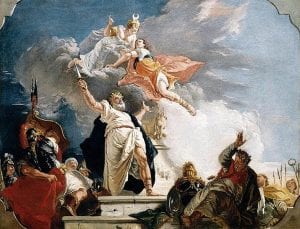*Spoilers ahead*
I don’t think it would be at all interesting to write a plot synopsis of Iphigenia, so instead I’m going to do a quick analysis of each of the consequential characters and their major traits.
- Agamemnon – King of Argos, Father of Iphigenia, Husband of Klytaimestra,
- Loves Greece – Is the General of all fighting forces sailing to Troy. Sees conflict with Troy as the only way to protect Greece from raids carried out by barbarous Trojans.
- Loves his Iphigenia – Doesn’t want to sacrifice his daughter but sees it as the only way to appease Artemis and carry on with the war.
- Is strictly reactive – At each turn, from the first scene to the last, Agamemnon was reacting to the actions of others. He was told to sacrifice his daughter by Calchas, convinced to do so by Menelaos, forced to carry through with it by the actions of Odyssseus and so on.
- Klytaimestra – Mother of Iphigenia, Wife of Agamemnon
- Happiness/Grief – Exists in the play mostly to show pride that her daughter is going to marry a hero and then grief that she is going to be sacrificed. Her emotions are a sort of outsized reaction of what the audience is meant to feel for Iphigenia, particularly when she’s pleading with Achilles to save her. If she has a fault it is her womanliness, which is more of an issue with contemporary society making it impossible for her to act on her own to effect the outcome of the situation.
- Old Man – Slave of Agamemnon and Klytaimestra
- Loyalty – The only non-named character to make this list earned his place because of the multiple times he put himself in danger in order to carry out orders he had been given by his master, first by trying to retain his letter from Menelaos, then by exposing the sacrificial plot to Klytaimestra and Achilles. Both of these events were attempts to save Iphigenia’s life and save Klytaimestra from strife.
- Achilles – Chief of contingent of the army, Greek Hero, son of goddess, Thetis
- Honor/Duty – Achilles agrees to defend Iphigenia from her father and the hordes of Greek soldiers, not because she is innocent and deserves to be saved, but rather, he promises to save her because she was lured there using his name. Because Agamemnon used his name to lure Iphigenia there without his knowledge he feels responsible to protect her, however, Achilles explicitly states that had he been informed of the plot to lure Iphigenia before it was carried out he would have cosigned it. This demonstrates that it isn’t some “defense of the innocent” moral that he is guided by, but that his personal honor is most important to him.
- Iphigenia – Daughter of Agamemnon and Klytiamestra, sacrifice to Artemis
- Innocence – Iphigenia is the only character who is without a fault in my mind. She acts without pride or ulterior motive throughout the play, doing what she thinks is fair or what is best for all.
- Selflessness – Being the only character that shows growth (honorable mention to Menelaos, who wasn’t important enough to make this list), Iphigenia goes from frantic at the thought of being sacrificed, to at peace with the idea. It is imparting this selflessness onto the audience that was the object of the play.
This is everyone I felt deserved a place on a “consequential characters” list. I was tempted to add Menelaos but I don’t see him as having a particular personality and his only action in the play was to foil the plot to get Iphigenia not to arrive, however that event didn’t necessarily have to be because of him, inclement weather stopping the messenger would have been just as effective.
